FAQ ON DOG NUTRITIONS
A nutritious, balanced diet is essential for keeping your pets healthy. The majority of pet owners trawl the pet food isles at supermarkets and pet stores trying to select the best product for their pet. Many owners feed their pets home-made diets and ask their vet for advice in this area. Finally, many pets are prescribed specially formulated food by their veterinarian to help prevent or manage certain medical conditions such as kidney stones or allergies.
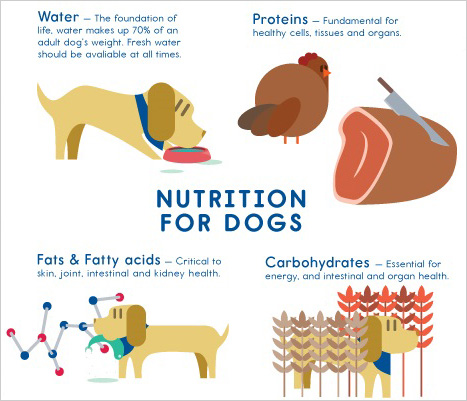
Why is it important for my pet’s food to be nutritionally balanced?
A nutritionally balanced diet is vital for your pet’s metabolism and good health. Commercial pet foods are formulated to be the main nutritional source and the ingredient ratios: protein / carbohydrate/fat/ vitamins and minerals are essential in making your pet’s diet complete and balanced.
It is important to ensure the nutrients in pet foods are correctly balanced for each species, as imbalances could lead to health problems in your pet: for example, a deficiency in a certain amino acid could retard growth; too much protein in a diet leading to an excess of phosphorus may exacerbate kidney disease
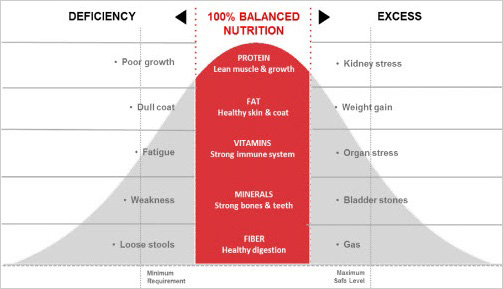
Pet food companies aim to meet the nutritional requirements of cats and dogs that are published by internationally-recognised expert bodies such as the USA body, the National Research Council’s Committee on Animal Nutrition. Products that are labelled "complete and balanced," as defined by the Association of American Feed Control Officials (AAFCO), must meet guidelines to be sure they meet certain nutritional requirements.
The need for a correctly balanced diet is why reputable pet food companies hire trained veterinary nutritionists to select ingredients carefully and find the best nutrient balance for optimal health. Furthermore, this is why it can be difficult and time-consuming to try to formulate nutritionally-balanced diets at home using standard human food ingredients.
Are the more expensive pet foods more nutritious and better for my pet?
Not necessarily. Price should not be the only consideration when choosing pet food. One of the most important things to consider is the type of ingredients listed on the label. Ingredients are listed on the ingredient list primarily by their percentage weight of the formula. The ones that come first are the ones that are present in the greatest amount in the formula.
What is wrong with buying the cheapest pet food I can find?
Higher quality pet foods, which tend not to be the cheapest available, are more likely to be formulated by in-house veterinary nutritionists, using high-quality ingredients. The products from well-known reputable pet food companies generally contain higher levels of good-quality protein and less carbohydrate ‘’bulk’’, and you can be confident the nutritional balance is correct. At the very least, this means there will be less dog poo to collect and dispose of– and that is surely worth a few extra cents per day!
What should be found in the first several ingredients listed on a pet food pack?
When looking at the ingredient listing, you should first see one or two quality protein sources (meats or deyhydrated meat meals), one or more source of carbohydrates (whole grain is best), and a quality fat or oil source.
What are the best sources of quality protein?
Proteins provide the basic building blocks for growth, maintenance, and repair of body tissues. The highest quality proteins for use in dog foods come from a variety of animal-based sources including chicken, lamb, turkey, beef, fish and eggs.
Why is fat an important ingredient in pet food?
Fat is a concentrated form of energy, providing more than twice the energy of proteins or carbohydrates. Fat is required for absorption and utilization of fat-soluble vitamins (A, D, E, and K). Fats supply fatty acids, which provide healthy skin and coat, as well as reduce inflammation. Fatty acids promote heart health and optimal brain function. Fats also make pet food taste better.
Are “natural” ingredients the most important element in a pet food?
“Natural” means that, according to FDA (Food and Drug Administration, USA) guidelines, the ingredients in the pet food have not had any chemical alterations made to them.
No, natural ingredients are not the most important element in a pet’s food. Excellent pet nutrition is not just about which ingredients are used - it's about the balance of nutrients (carbohydrates, protein, fats/oils, minerals and vitamins) in the formula. An excess of nutrients, as well as insufficient nutrients, can be harmful to your pet's health.
Should I follow the feeding recommendations on my pet food?
Feeding recommendations can be good guidelines, but the animals these guidelines are based on get more exercise than the average pet. Evaluate daily food portions based on your pet’s age, body condition, and overall health. And be sure to ask your vet to check your pet’s weight and condition at every visit, and seek advice on your pet’s dietary needs.
WHAT IS A “BODY CONDITION SCORE”?
The body condition score is a system for determining your pet’s ideal weight. The system ranges from ‘’underweight’’ to ‘’ideal’’ to ‘’overweight’’, and is based on a visual and palpable examination of the pet.
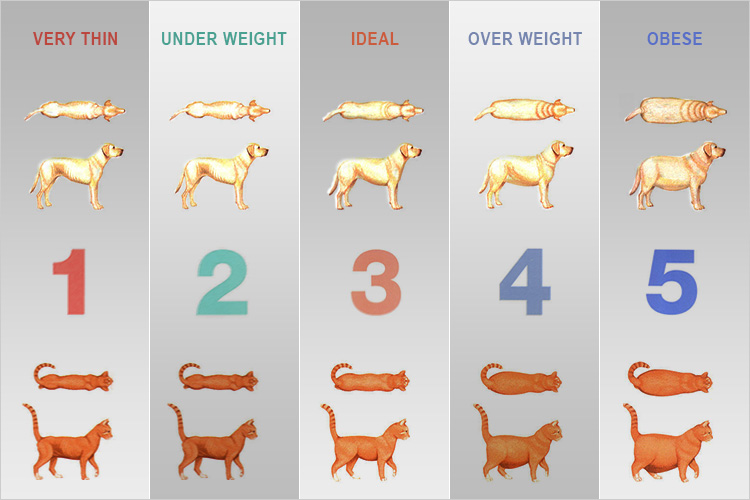 How can I tell if my pet is overweight?
How can I tell if my pet is overweight?
Stand above pets and look down on them. From this vantage point you should be able to feel their ribs but not see them. Both dogs and cats should also have a nice taper at their waist. If they are too heavy, they’ll be oval shaped. Check with your vet to be sure!
How did my pet get so fat?
Weight gain is the result of an increase in body fat. This is usually caused by eating too much, especially when combined with lack of exercise. But there can be other contributing factors too...
1. Age
Older pets are less active, have less energy, and require fewer calories.
- Your pet’s metabolism starts to slow down at around 5 years of age
2. Breed
- Some breeds are more likely to gain weight.
- These include Labrador Retrievers, Cocker and King Charles Cavalier Spaniels and Golden Retrievers.
3. Neutering / desexing
- Clinical studies have shown that the basic metabolism of desexed pets is lower.
- Desexed pets actually require fewer calories.
4. Medical Problems
- Very occasionally weight gain is associated with a medical disorder that may require specific treatment, or results from the use of medication such as cortisone.
How much food needs to be cut from the pet’s diet for weight loss?
Veterinarians generally recommend cutting your pet’s food intake by 25%, and gradually increasing their daily exercise as a good way to achieve weight loss in the overweight pet. It is a good idea not to leave food out all day for your pet if they are overweight, as “24-hour grazing” can lead to weight gain. Remove uneaten food five minutes after first offering food, particularly in overweight pets.
Do puppies and kittens need special food?
Yes. Puppy and kitten foods are designed to provide adequate nutrition for the rapid growth phase without providing too many calories. Optimal nutrient profiles are especially important for large breed puppies, who can develop painful bone conditions when they are allowed to grow too quickly. Once again, choose a reputable pet food brand when feeding
Do senior pets need special food?
Yes. Your veterinarian can help you choose an appropriate diet for your senior pet. For example, diets lower in sodium are sometimes advocated for dogs with heart disease, while diets that help control phosphorus, calcium and other electrolyte levels are given to dogs and cats with kidney disease. Some senior diets contain added ingredients to promote joint health.
What is a good example of a properly balanced dog food?
There are many excellent products on the shelves today that are labelled "complete and balanced" and meet the AAFCO’s nutrient profiles.
Why are 'human' ingredients like apples and carrots used in dog food?
Common fruits and vegetables eaten by humans are also very healthy and beneficial for dogs. They provide essential vitamins and minerals that maintain health and prevent disease. Pet food manufacturers are using these ingredients more and more commonly as consumers become better aware of their benefits.
Should I feed my pets bones?
Yes, most pets should be offered raw, meaty bones to help maintain good dental hygiene. Since most pets do not have their teeth cleaned twice daily, dental disease affects more than half of pets over the age of 4 years, making it one of the most common problems encountered in veterinary practice. In order to prevent or at least to slow down the development of dental disease, most veterinarians advise the following:
- Avoid soft, canned diets as these foods stick between the teeth and allow bacteria to grow.
- Try to buy a good quality, premium dry food that makes reference to oral hygiene. These foods have a larger kibble that need to be chewed.
- Encourage chewing. The best method for keeping your pets teeth clean is to regularly feed them RAW, meaty bones, for example chicken necks or brisket bone. Dogs' and cats' teeth are designed to chew through bone and muscle and this chewing activity helps to sweep the plaque off the teeth.
- Always start gradually when introducing bones into the diet and remember that all bones must be RAW. Never feed any cooked bones, as these are weakened and can splinter and damage your pet’s intestinal tract.
- For small puppies and kittens raw chicken necks are a good start, then once they are larger, try chicken wings. Large dogs can be given brisket bones or lamb shanks.
- If your pet does not like raw bones, there are a number of excellent dental products available, such as “Greenies”!
Can I feed my pet a home-made diet?
You certainly can make up your own pet diet at home, if you have the time to research the correct nutritional content and prepare the food. Your veterinarian can advise you on home-made pet diets or suggest some reputable websites to research this topic.
There are a number of nutritional supplements available for pets, which will help to ensure a home-made diet contains the correct vitamin and mineral balance when the supplements are added to other fresh ingredients

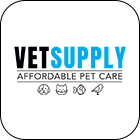









































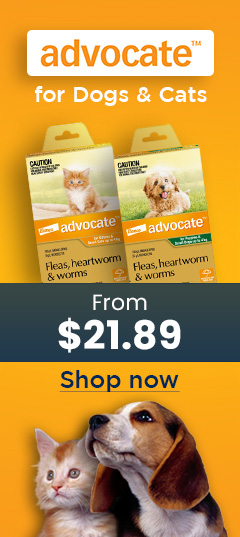
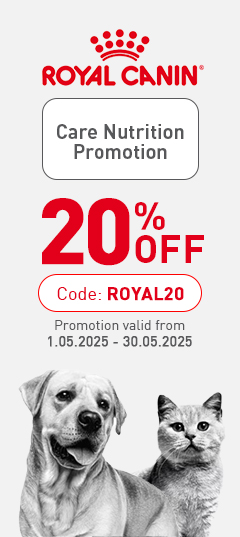

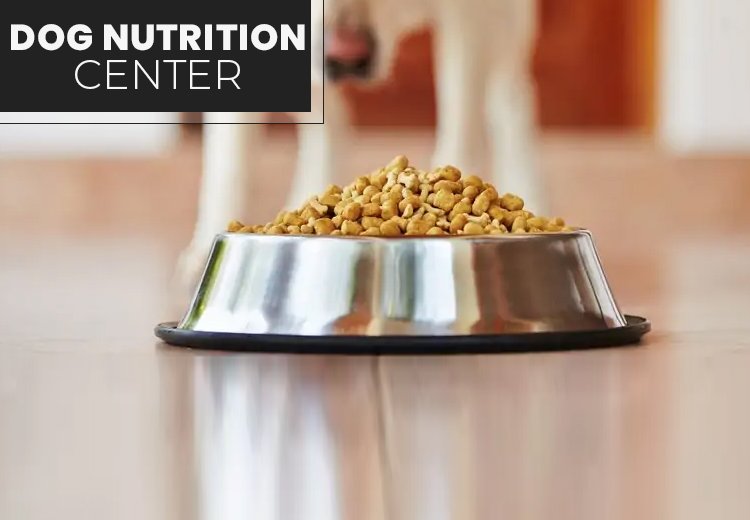


 How can I tell if my pet is overweight?
How can I tell if my pet is overweight?
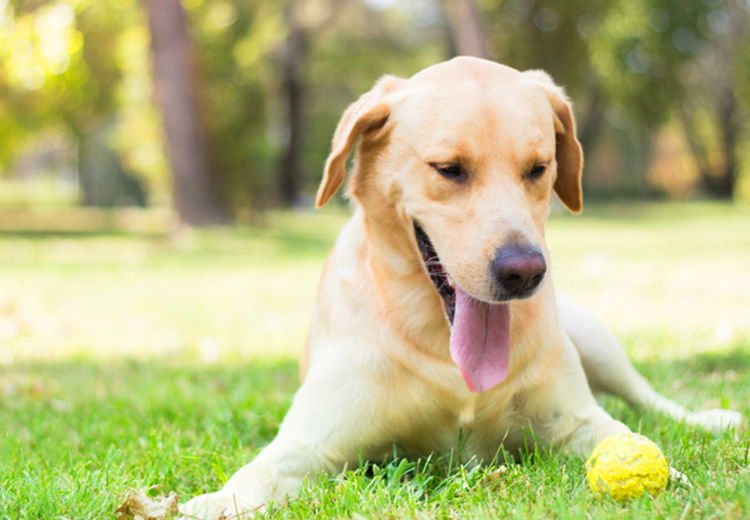

_12312024_032748.jpg)













